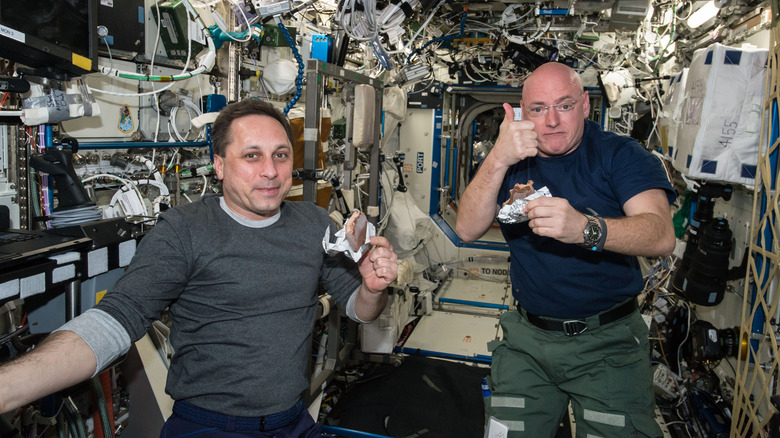The Reason Why You're Not Allowed To Have Bread In Space
Astronauts must follow a host of stringent guidelines when they're bouncing around outer space. From the obvious, like never taking off their helmet while on a spacewalk, to the not so obvious, like never doing laundry. NASA can put men on the moon but still hasn't figured out how to get its astronauts' unmentionables through a spin cycle.
Also on the "no-can-do" list are many things most Earth-bound folks take for granted that virtually every astronaut on the International Space Station would kill for. Showers, going to the bathroom without incident, crying like an average person (lack of gravity keeps tears in the eyeballs), writing your memoirs with an ordinary pen under the light of the silvery moon, or having a nice adult beverage after a long day at the space office.
This ban even extends to the most ordinary of foods — the humble loaf of bread, in all its many forms. Why? Because it's messy. It breaks apart — crumbling, if you will — into teeny tiny bits and baubles that, when released into an environment without gravity, could get sucked into an air vent, get lodged, and start a fire. They can weasel their way into some expensive equipment and cause it to short circuit. Or, some small bit of wheat or barley might end up in an experiment not meant to have said ingredients.
Peanut butter and jelly... on a tortilla?
But bread's banned status hasn't stopped NASA's helmeted heroes from sneaking it on board. During the 1965 Gemini III mission, pilot John Young brought a corned beef sandwich with him in his spacesuit. A few hours into the flight, he removed it, took a bite, and gave some to commander Virgil "Gus" Grissom, who also partook, then quickly stuffed it into his suit. According to NASA, the sandwich was only out in the open for less than a minute, but some crumbs did manage to break off.
NASA has long allowed astronauts to eat tortillas instead because they don't leave behind crumbs, have a much longer shelf life, and take up far less storage space due to their flat nature.
In recent years, companies like Bake In Space have begun developing and testing new ways to bring fresh bread to astronauts. Several hurdles — not the least of which is finding out how dough bacteria react in space and how the bread would actually get baked — must be overcome before NASA starts having regular bake sales in space.
Comforts from home, like the smell of freshly baked bread, might actually "energize astronauts physically and psychologically," said Jennifer Levasseur from the Smithsonian National Air and Space Museum.
